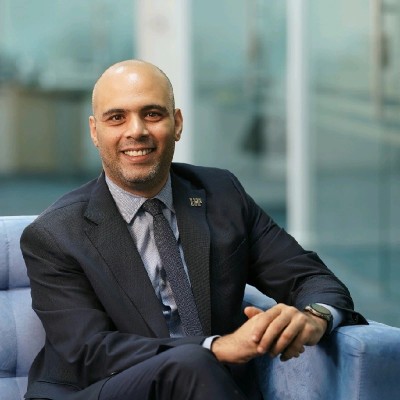Emily Shanks, Awards Executive at TALiNT Partners spoke to TIARA Awards Judge, Hisham ElSaied, Regional HR Head – MENA at Helmerich & Payne about building efficient HR systems and integrating cultural intelligence.
ES: As someone with over 18 years of experience in HR across the MENA region, how has your background in strategic HR management prepared you to found HR in Dubai?
HE: With a vision of fostering a collaborative HR community in the UAE, I wanted to create a space where HR professionals can share their expertise on various scenarios and support each other with free advice.
Having worked in the MENA region for 18 years, I believe I understand employment laws, cultural dynamics, and best practices specific to the region.
I have experience across various industries within MENA from transportation to engineering, and IT to oil & gas. This broadens my perspective and equips me to handle complexities specific to different sectors within the region’s dynamic economy.
I also had a strong network in the region which I wanted to leverage to benefit the community.
ES: Can you share insight into your approach to building efficient HR systems and teams, particularly in the context of your role at Helmerich & Payne as the Regional HR Head for MENA?
HE: During my time as the Regional HR Head for MENA at H&P, we experienced a period of rapid expansion, requiring us to ramp up our HR function significantly, these are the main areas which we are focusing are:
- Standardised Onboarding Process: We developed a streamlined onboarding process that could be quickly implemented for new hires across different MENA countries. This ensured a smooth integration for new employees and minimised disruption, considering the local requirements in each country.
- Recruitment Strategies: We leveraged online job boards, recruitment agencies specialising in the MENA region, to attract qualified candidates efficiently.
- Leverage technology: We implemented online assessments and standardised interview processes to expedite candidate screening during high-volume hiring periods.
- Developing Policies and Procedures for New Countries: We established a core set of global HR policies as a foundation, then partnered with local legal counsel in each new country to tailor them to meet specific labor laws and regulations.
- Cross-Functional Collaboration: We encouraged collaboration between HR personnel in different MENA countries, leveraging their combined knowledge and experience during the scaling-up process.
- Flexible Staffing Solutions: We had to think out of the box, so we explored temporary staffing options or outsourcing specific tasks to manage the workload during the initial scaling-up phase.
By focusing on these strategies, we were able to build a robust HR function that effectively supported H&P’s rapid growth in the MENA region. This allowed us to hire large numbers of employees quickly, integrate them smoothly, and ensure compliance with local regulations in each new country we entered.
While hard skills are essential, cultural differences significantly impact how we perceive identity, authority, communication, and even time itself.
ES: Your passion for cultural intelligence is evident through your LinkedIn. How do you integrate CQ principles into your people agenda, especially when fostering organisational capabilities across diverse teams in the MENA Region?
HE: Having worked with Japanese, American, Canadian, and French companies across four continents, I’ve collaborated with individuals from 45 nationalities. This rich experience, along with my multicultural family – my wife, daughter, and I all hail from different backgrounds – has instilled a deep personal connection to Cultural Intelligence (CQ).
CQ is often the underestimated secret weapon. While hard skills are essential, cultural differences significantly impact how we perceive identity, authority, communication, and even time itself. Different cultures have distinct relationships with time! That’s why I’m passionate about educating and training others on the importance of CQ. In today’s globalised and multicultural world, it’s a mandatory skill for success.
ES: How do you see the intersection between CQ and talent acquisition, and what benefits does this bring to organisations operating in diverse regions?
HE: Cultural Intelligence (CQ) plays a vital role in talent acquisition, especially for organisations operating in diverse regions.
Firstly, understanding cultural nuances in communication styles and job postings makes your organisation more attractive to a wider range of talent.
Second, CQ helps identify and mitigate unconscious bias during the recruitment process. By recognising cultural differences in resumes, interview styles, and communication patterns, you ensure a fair evaluation based on qualifications.
And finally, Integrating CQ principles into the interview process creates a more welcoming and inclusive experience for candidates from different backgrounds. This fosters positive employer branding and attracts more qualified individuals. From job posting to interview to the onboarding and integration, CQ helps in creating an inclusive environment, reduce turnovers and develop the candidates and employees’ experiences.
ES: You’ve recently joined the judging panel for the 2024 TIARA Awards, what inspired you to take on this role, and what do you hope to contribute to the judging process?
HE: The TIARA Awards hold a prestigious reputation for recognising top performers in the recruitment industry and the awards’ emphasis on innovation in talent acquisition aligns perfectly with my own values.
I’m eager to see how these agencies are pushing boundaries and developing creative solutions in a rapidly evolving recruitment landscape. I can offer insights from a strategic HR perspective, evaluating how well recruitment efforts align with an organisation’s overall business goals and talent management strategy.
ES: With your extensive experience in talent acquisition and development, how do you plan to leverage your expertise while evaluating the submissions for the 2024 TIARA Awards?
HE: Having experience across diverse regions, I will bring a global viewpoint to the judging panel. This allows for a holistic evaluation of entries and recognition of successful strategies and in assessing how effectively nominees cater to a globalised talent pool and foster inclusive recruitment practices.
Ultimately, I hope to contribute to an insightful judging process that recognises the most outstanding achievements in recruitment in a fast-paced landscape.
ES: What are you most excited to learn from the insights shared by the 2024 Finalists, and how do you envision these insights influencing your future HR strategies?
HE: I believe in a data-driven approach to talent acquisition. I can evaluate how nominees use data and analytics to measure the success of their recruitment strategies and identify areas for improvement.
I am also eager to discover new approaches to attracting, assessing, and onboarding talent that I can potentially integrate into my own HR strategies.







